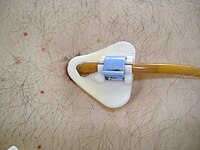
Endoscopic ultrasonography‐fine needle aspiration of solid pancreatic masses: Do we need the fourth pass? A prospective study
Sign Up to like & getrecommendations! Published in 2020 at "Diagnostic Cytopathology"
DOI: 10.1002/dc.24669
Abstract: Endoscopic ultrasonography‐guided fine‐needle aspiration (EUS‐FNA) is important for the differential diagnosis of solid pancreatic lesions. Sample adequacy is related to the number of needle passes, and European guidelines recommend three to four needle passes with… read more here.
Keywords: endoscopic ultrasonography; fine needle; needle aspiration; solid pancreatic ... See more keywords

Endoscopic Ultrasonography‐Guided Fine Needle Aspiration Can Be Used to Rule Out Malignancy in Autoimmune Pancreatitis Patients
Sign Up to like & getrecommendations! Published in 2017 at "Journal of Ultrasound in Medicine"
DOI: 10.1002/jum.14265
Abstract: The aim of this study was to review the suitability of endoscopic ultrasonography‐guided fine needle aspiration (EUS‐FNA) for ruling out malignancy in autoimmune pancreatitis patients. read more here.
Keywords: guided fine; needle aspiration; endoscopic ultrasonography; fine needle ... See more keywords

Endoscopic ultrasonography and computed tomography scanning for preoperative staging of colonic cancer
Sign Up to like & getrecommendations! Published in 2017 at "International Journal of Colorectal Disease"
DOI: 10.1007/s00384-017-2820-x
Abstract: PurposeWith an increasing demand for more accurate preoperative staging methods for colon cancer, we aimed to compare preoperative tumour (T)- and nodal (N)-stage in patients with left-sided colon cancer by endoscopic ultrasonography (EUS) and computed… read more here.
Keywords: risk; computed tomography; preoperative staging; endoscopic ultrasonography ... See more keywords

Diagnostic yield of conventional endoscopy with endoscopic ultrasonography for submucosal invasion of superficial esophageal squamous cell carcinoma: a post hoc analysis of multicenter prospective confirmatory study (JCOG0508)
Sign Up to like & getrecommendations! Published in 2021 at "Esophagus"
DOI: 10.1007/s10388-021-00815-3
Abstract: Endoscopic ultrasonography (EUS) is reportedly the reliable modality to predict the depth of esophageal squamous cell carcinoma (ESCC), however, most previous studies are retrospective or single-centered. We aimed to evaluate the diagnostic ability of conventional… read more here.
Keywords: esophageal squamous; conventional endoscopy; endoscopic ultrasonography; eus ... See more keywords

Usefulness of magnifying endoscopy and endoscopic ultrasonography for the gastric involvement of follicular lymphoma
Sign Up to like & getrecommendations! Published in 2019 at "Clinical Journal of Gastroenterology"
DOI: 10.1007/s12328-019-01015-4
Abstract: A 61-year-old man received an esophagogastroduodenoscopy for further investigation of mesenteric lymphadenopathy. Esophagogastroduodenoscopy revealed swollen gastric folds and cobble stone mucosa in the gastric body. Magnifying endoscopy with narrow-band imaging showed branched abnormal vessels and… read more here.
Keywords: lymphoma; magnifying endoscopy; follicular lymphoma; endoscopic ultrasonography ... See more keywords

A case of pancreatic walled-off necrosis successfully treated with endoscopic ultrasonography-guided drainage using Hot AXIOS System in a patient with severe hemophilia A
Sign Up to like & getrecommendations! Published in 2021 at "Clinical Journal of Gastroenterology"
DOI: 10.1007/s12328-021-01528-x
Abstract: Hemophilia A causes a bleeding tendency due to the congenital absence of coagulation factor VIII or the production of antibodies against it. It is challenging to perform invasive procedures in patients with hemophilia A. Walled-off… read more here.
Keywords: hot axios; drainage; walled necrosis; endoscopic ultrasonography ... See more keywords

A double-guidewire technique for endoscopic ultrasonography-guided pancreatic drainage after pancreaticoduodenectomy
Sign Up to like & getrecommendations! Published in 2022 at "Endoscopy"
DOI: 10.1055/a-1974-9436
Abstract: Endoscopic ultrasonography-guidedpancreatic drainage (EUS-PD) is challenging owing to technical difficulties. The most important factor for these difficulties is the risk of guidewire dislodgement due to the short length of the guidewire, which can be left… read more here.
Keywords: guidewire; guidewire technique; endoscopic ultrasonography; double guidewire ... See more keywords

Linear array endoscopic ultrasonography for a patient with situs inversus totalis
Sign Up to like & getrecommendations! Published in 2023 at "Endoscopy"
DOI: 10.1055/a-1990-0753
Abstract: Situs inversus totalis (SIT) is a rare congenital anomaly with complete inversion of the viscera [1]. The altered anatomical position of the organs can cause great technical challenges in endoscopic procedures [2]. A 33-year-old man… read more here.
Keywords: linear array; endoscopic ultrasonography; inversus totalis; situs inversus ... See more keywords

Endoscopic ultrasonography for preoperative staging of esophageal carcinoma
Sign Up to like & getrecommendations! Published in 2017 at "Scandinavian Journal of Gastroenterology"
DOI: 10.1080/00365521.2017.1339829
Abstract: Abstract Objective: To evaluate the diagnostic value of endoscopic ultrasonography (EUS) in preoperative staging of esophageal carcinoma (EC). Material and methods: A total of 86 surgical patients with EC who were confirmed by endoscopy and… read more here.
Keywords: preoperative staging; value; esophageal carcinoma; endoscopic ultrasonography ... See more keywords

Current status of endoscopic detection, characterization and staging of superficial esophageal squamous cell carcinoma.
Sign Up to like & getrecommendations! Published in 2022 at "Japanese journal of clinical oncology"
DOI: 10.1093/jjco/hyac064
Abstract: BACKGROUND This review focuses on the current status of endoscopic detection, characterization and tumour category staging of oesophagealsquamous cell carcinoma. DETECTION The diagnostic yield of white-light imaging is limited and narrow-band imaging has demonstrated a… read more here.
Keywords: band imaging; characterization; endoscopic; endoscopic ultrasonography ... See more keywords

Endoscopic Ultrasonography May Select Subjects Having Asymptomatic Chronic Pancreatic Hyperenzymemia Who Require a Stricter Follow-up
Sign Up to like & getrecommendations! Published in 2017 at "Pancreas"
DOI: 10.1097/mpa.0000000000000796
Abstract: Objectives We have previously shown that at least 50% of patients with asymptomatic chronic pancreatic hyperenzymemia (ACPH) may develop morphological pancreatic alterations. Endoscopic ultrasonography (EUS) may detect small lesions, and its sensitivity seems to be… read more here.
Keywords: patients acph; asymptomatic chronic; endoscopic ultrasonography; chronic pancreatic ... See more keywords